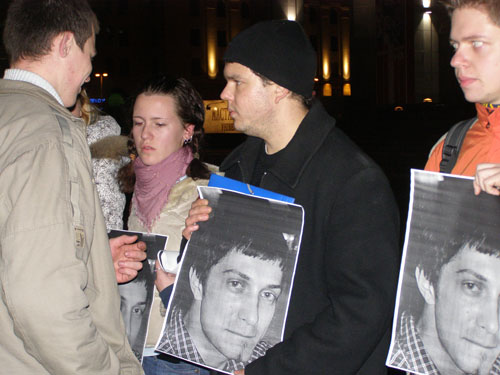Aliaksandr appears in a criminal case, launched in January, against protesting small entrepreneurs. The case is unofficially referred to as “the trial of the fourteen”. Contrary to the other defendants, Mr Barazenka was able first to avoid the verdict by ignoring a summons. Having spent some time studying at Wroclaw University (in Poland), he came back to Belarus and was not able to leave the country any more, as he was on the list of individuals prohibited from leaving Belarus.
On 27 October Aliaksandr Barazenka voluntarily appeared before the case investigator, Mr Mikhalkevich, then was arrested and moved to the pre-trial detention prison. “Mr Barazenka is going to be held under pre-trial arrest until the hearing, unless the preventive punishment measure is changed. I am going to apply for it to the prosecutor’s office these days”, the lawyer of the detained activist, Paval Sapelka, said to “Nasha Niva online”.
 On the same evening, four participants of a spontaneous solidarity manifestation to support Aliaksandr Barazenka were detained in Minsk. A day later, on 29 October, three participants of a similar manifestation in Pinsk were also detained. In both cases, the detained were taken to a police station and arrested without drawing up a statement of the case.
On the same evening, four participants of a spontaneous solidarity manifestation to support Aliaksandr Barazenka were detained in Minsk. A day later, on 29 October, three participants of a similar manifestation in Pinsk were also detained. In both cases, the detained were taken to a police station and arrested without drawing up a statement of the case.
The Human Right Center “Viasna” released a statement condemning the actions of the Belarusian authorities and expressing concern that “the arrest of Aliaksandr Barazenka has happened against the background of some concessions being made by the EU to Belarusian officials (lifting visa sanctions, resuming official contacts of the EU members states with official Minsk etc.)”.
Shadow over improving EU-Belarus relations
Mr Barazenka was arrested the same day as the delegation of the European Parliament was visiting Vilnius looking for the opportunity to start a dialogue between Brussels and Minsk. The impetus to the dialogue was given by the recent release of political prisoners in Belarus. The inadmissibility of new political prisoners appeared as a topic on the table again as the MEPs visited the Embassy of Belarus in Lithuania.
During a meeting on 30 October with the counselor of the Belarusian Embassy, Valery Baranouski, the guests from the EP advocated for Aliaksandr Barazenka. In six months, when deciding on either resuming or lifting the now suspended visa sanctions against Belarusian officials, Brussels is likely to consider if any progress has been achieved in the dialogue with Belarusian Government.
A new political prisoner is “an indicator of inconsistence which can cast a shadow over these six months”, Jacek Protasiewicz, the Chairman of the EP Commission on Belarus told "Deutsche Welle" after the meeting at the embassy. “I have told the Deputy Ambassador distinctly and clearly that we do not see any reason to arrest a person under the same charges Mr Kim and Mr Parsiukevich have been recently released”.
The Embassy of Belarus promised to pass this position to Minsk, but they stated that when the law is violated it is up to the judiciary to decide. Mr Protasiewicz is not convinced of this argument, “The issue of personal freedom is crucial for the Western public opinion. Mr Barazenka is not a kind of recidivist who poses a threat to life and health of others. Obviously it is not the case, so why should he be put under pre-trial detention?”
A.Kazulin "I would prefer being a prisoner to seeing this happen"
The former political prisoner and a well-known opposition politician Aliaksandr Kazulin is not surprised there is a new political prisoner in Belarus. The former presidential election rival of Aliaksandr Lukashenka supports the idea of the EU-Belarus dialogue, but his concern is that the West can get deceived again by the conciliatory rhetoric of Belarusian authorities with reaching no substantial progress. “I would prefer being imprisoned to seeing this. It is not a problem for the Government to produce more political prisoners. Tomorrow there will be ten of them – and we will have again to negotiate just about releasing them”, Mr Kazulin said during a meeting with MEPs. The release of Mr Kazulin is viewed as the main concession by official Minsk to the West so far.


